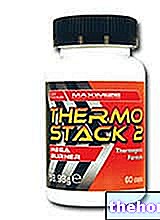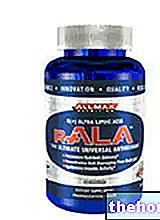In addition to saturated fats and cholesterol, carnitine contained in meat (and in many supplements and energy drinks) could also increase the risk of developing cardiovascular diseases, such as heart attack, stroke and thrombosis. On a superficial reading, this seems to be the conclusion reached by a group of researchers from the Cleveland Clinic, in Ohio *; however, some aspects of this study should be clarified to avoid unnecessary alarmism and mystification.

First of all, the increase in cardiovascular risk would NOT be caused directly by carnitine, but by its metabolite, TMAO (trimethylamine-N-oxide), which negatively interferes with cholesterol metabolism by promoting the formation of atherosclerotic plaques. in the mouse. The TMAO, of which the meat of fresh fish is quite rich, derives from the metabolism of carnitine by some intestinal bacteria. In practice, as with most of the nutrients taken with food, the amount of carnitine that is not absorbed in the small intestine it is digested by some bacteria present in the colon.
The intestinal flora is a sort of fingerprint, in the sense that it changes (even considerably) from one subject to another. Its composition depends on numerous factors, starting from birth (cesarean or vaginal birth, hospital or home environment , breastfeeding or formula, etc.) up to the type of feeding. In fact, precisely because these microorganisms feed on the residues of undigested and not absorbed food, the type of feeding strongly contributes to selecting the intestinal flora of an individual. of this premise, it is not surprising how the levels of TMAO-producing bacteria are significantly higher in the intestine of those who consume a diet rich in meat; on the other hand, the researchers found that these bacteria are much less represented in the intestine of lacto-ovo-vegetarian subjects, and even less in those who completely avoid animal proteins (vegan diet).
In addition to carnitine, it should be emphasized that other substances can also be converted into TMAO in the intestine; this is the case of choline and lecithins, which are abundant in eggs (concentrating in the yolk) and in many industrial products (especially confectionery) due to their emulsifying function.
At this point, we have all the elements to reach some important considerations:
- A diet too rich in meat and eggs can favor the onset of cardiovascular diseases also through mechanisms independent of the intake of cholesterol and saturated fats;
- An excess of carnitine or lecithins through supplements could also increase cardiovascular risk; for the same reason, also fishery products (fish, molluscs, crustaceans), being naturally very rich in TMAO, could increase the cardiovascular risk
... therefore, without forgetting that:
- Carnitine (which can be synthesized independently by the body) is a very important nutrient for the activity of the heart (and not only), so much so that it is administered for example after a heart attack to promote the contractile efficiency of the heart muscle. this is considered a generally protective nutrient for the heart.
- The integration of lecithin favors the reduction of cholesterol levels in the blood, since it reduces intestinal absorption and promotes the reverse transport of cholesterol "clearing the arteries" of lipid deposits.
- Fish is rich in omega-3, nutrients useful in the prevention of cardiovascular risk, especially for their anti-inflammatory and antihypertensive action. A diet rich in fish, despite its high concentrations of TMAO, is therefore generally considered protective against heart disease.
... the results of the study are nothing more than the umpteenth invitation to:
- Consume a varied and balanced diet, avoiding single-issue diets and food excesses in general.
- Do not exceed, especially for long periods of time, the recommended intake doses for supplements (this applies in general, not only for those of carnitine and soy lecithin).
- Consider the results of scientific studies as a small piece in the very complicated puzzle of health, where common sense and previously acquired scientific knowledge help us to recompose the background image.
ATTENTION, therefore: the biological effects of a food cannot be reduced or confused with one of the biological effects of one of its innumerable components; instead, an overall vision is needed.
Bibliography:
* Intestinal microbiota metabolism of l-carnitine, a nutrient in red meat, promotes atherosclerosis "
Koeth, Robert A; Zeneng Wang, Bruce S Levison, Jennifer A Buffa, Elin Org, Brendan T Sheehy, Earl B Britt, Xiaoming Fu, Yuping Wu, Lin Li, Jonathan D Smith, Joseph A DiDonato, Jun Chen, Hongzhe Li, Gary D Wu, James D Lewis, Manya Warrier, J Mark Brown, Ronald M Krauss, WH Wilson Tang, Frederic D Bushman, Aldons J Lusis & Stanley L Hazen. Departmente of Cellular and Molecular Medicine, and Center for Cardiovascular Diagnostic and Prevention, Cleveland Clinic, Cleveland, OH, USA.
Nature Medicine 2013; 19: 576–85.
Other Foods - Amatriciana Meat Lamb - Lamb Meat Duck - Duck Meat Pork Chop Florentine Steak Boiled Broth Raw Meat Red Meat White Meat Beef Horse Meat Rabbit Meat Pork Meat Vegetable Meat Lean Meat Sheep and Goat Meat Carpaccio Ribs Cotechino Cutlet Snails or land snails Pheasant and Pheasant meat Guinea fowl - Guinea fowl meat Pork fillet Chicken Hamburger Hot Dog Kebab Patè Chicken breast Turkey breast Chicken - Chicken meat Meatballs Porchetta Quail - Quail meat Ragù Sausage Game Zampone OTHER ARTICLES MEAT Categories Food Alcoholic Meat Cereals and derivatives Sweeteners Sweets Offal Fruit Dried fruit Milk and derivatives Legumes Oils and fats Fish and fishery products Salami Spices Vegetables Health recipes Appetizers Bread, Pizza and Brioche First courses Second courses Vegetables and Salads Sweets and Desserts Ice creams and sorbets Syrups, liqueurs and grappas Preparations of Basic ---- In the Kitchen with Leftovers Carnival Recipes Christmas Recipes Diet Recipes Light Recipes Women's Day, Mom, Dad Functional Recipes International Recipes Easter Recipes Recipes for Celiacs Recipes for Diabetics Recipes for Holidays Recipes for Valentine's Day Recipes for Vegetarians Recipes Protein Regional Recipes Vegan Recipes



























